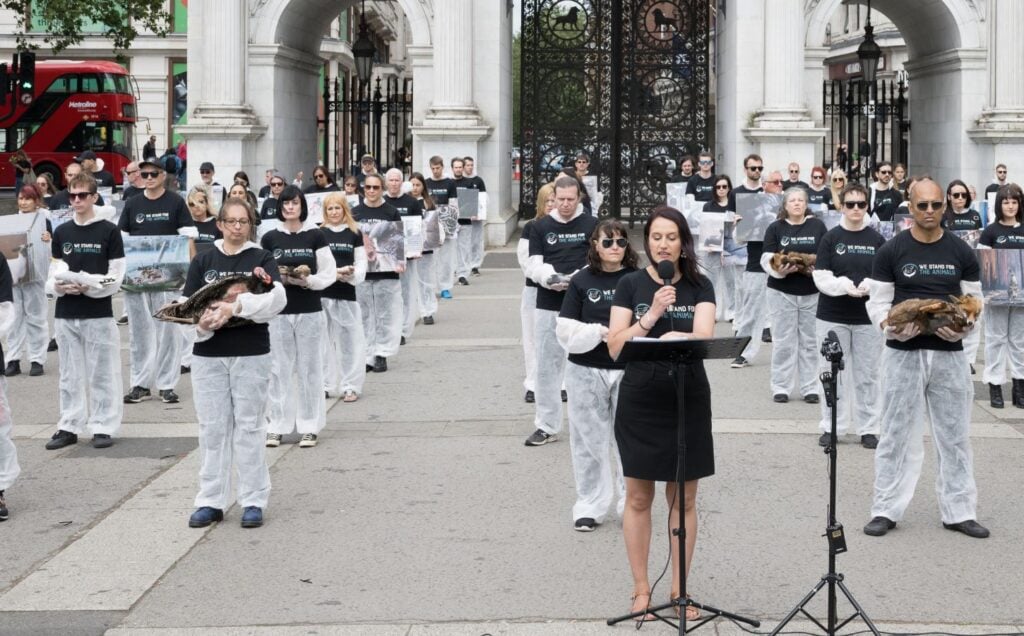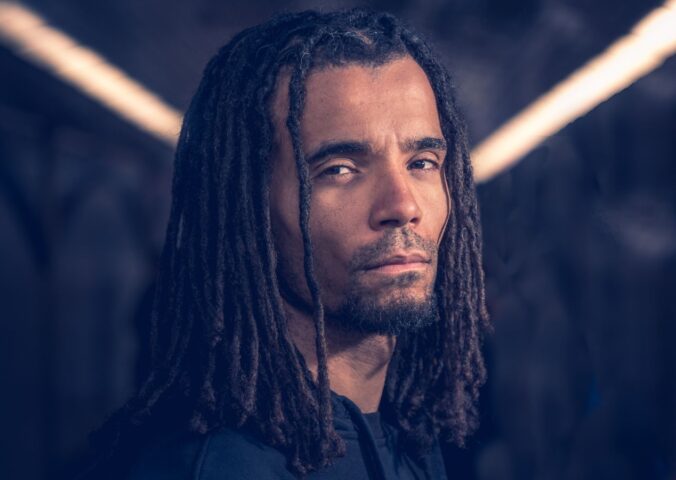*Warning: this article contains images that some people may find distressing*
Last Sunday (July 2, 2023), I was one of the 85 vegans who gathered together in Marble Arch, central London, to commemorate the countless non-human animals killed by the hands of humans.
The We Stand For The Animals memorial service is an annual event that shines a spotlight on the animals society turns away from. As a species, we kill 80 billion land animals – and two trillion fish – a year for food each year. We experiment on more than 100 million, and confine many more to captivity as objects to use for our entertainment. The scale of suffering we inflict is almost incomprehensible, but the vast majority goes unnoticed by the general public. The industries that exploit animals are often hidden from public view, and many people wilfully avoid learning the truth.
The memorial service is one method by which activists communicate this suffering to the public. As well as honoring and mourning the dead, the reality of industries of exploitation was also read out on a speaker by We Stand For The Animals founder Hannah Blake.
What is the memorial service?
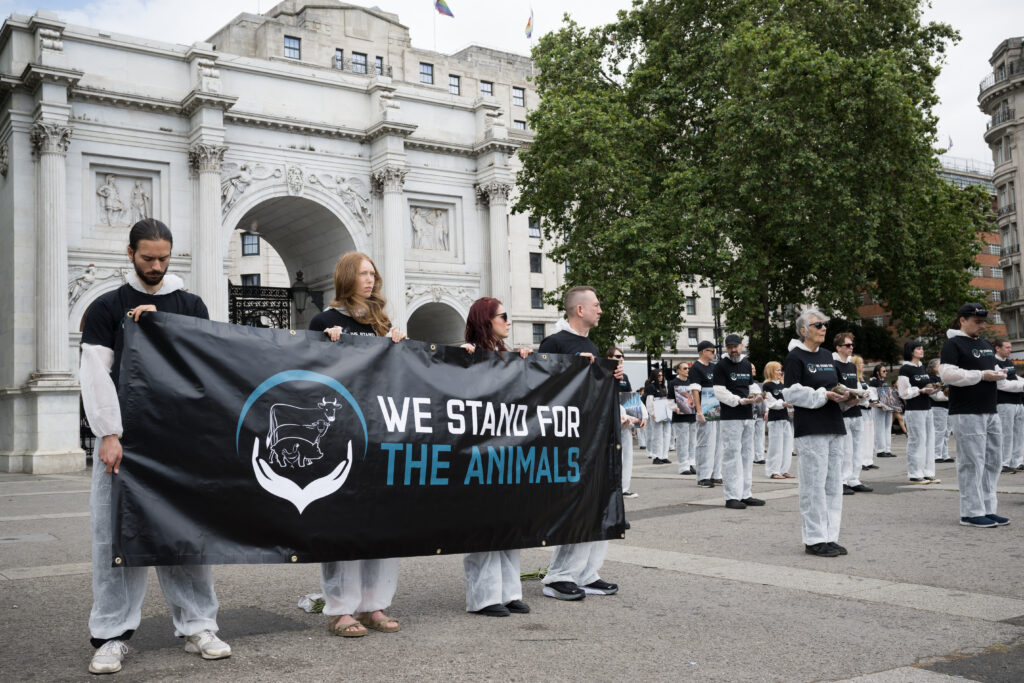
The service sees a group of vegans stand in formation in a public area. This year’s event took place in central London, where countless members of the public walked past as they visited attractions like Hyde Park and Oxford Street.
The ceremony participants dressed in coveralls and We Stand For The Animals t-shirts. Most held placards containing photographs of animals, but some held frozen dead animals. The dead animals represent the huge number who are abused by humans. While the deceased animals held in the ceremony were mostly donated from sanctuaries and other rescue centers, the vast majority of their species are not lucky enough to spend even a part of their lives in peace.
What animals are commemorated?
Farmed animals, including pigs and chickens, were among the animals commemorated in the ceremony. The vast majority of the world’s farmed animals are raised in torturous conditions on factory farms – but even those who aren’t still live miserable lives. There is a belief that animals raised on so-called “family-run” or “local” farms are treated well, but this is a myth propagated by the meat industry (as well as the general public so they can avoid feeling guilty). Animals raised on smaller farms are still mutilated, torn from their mothers as babies, and slaughtered in horrific ways. But even if an animal is raised in “better” conditions, this is still unacceptable. It is fundamentally wrong to use animals as commodities, and there is no way to “humanely” take the life of someone who wants to live. Animals are not here for us, and each has a right to live completely free from our control.
As well as those used in the food system, animals regularly kept in “zoos” and other captive environments were commemorated. While the zoo industry would have you believe that they exist for “conservation,” this is largely a marketing tactic. The majority of zoos in the UK don’t keep any endangered species, but even those who do don’t take meaningful steps to preserve them in the wild. Zoos have been repeatedly shown to prioritize profit over the animals. A previous study from the University of Bristol found that three quarters of British zoos failed to meet the minimum standards of animal wellbeing. But even if a zoo did provide so-called “welfare,” that wouldn’t take away from the fact that animals are there against their will, and that zoos are little more than prisons.
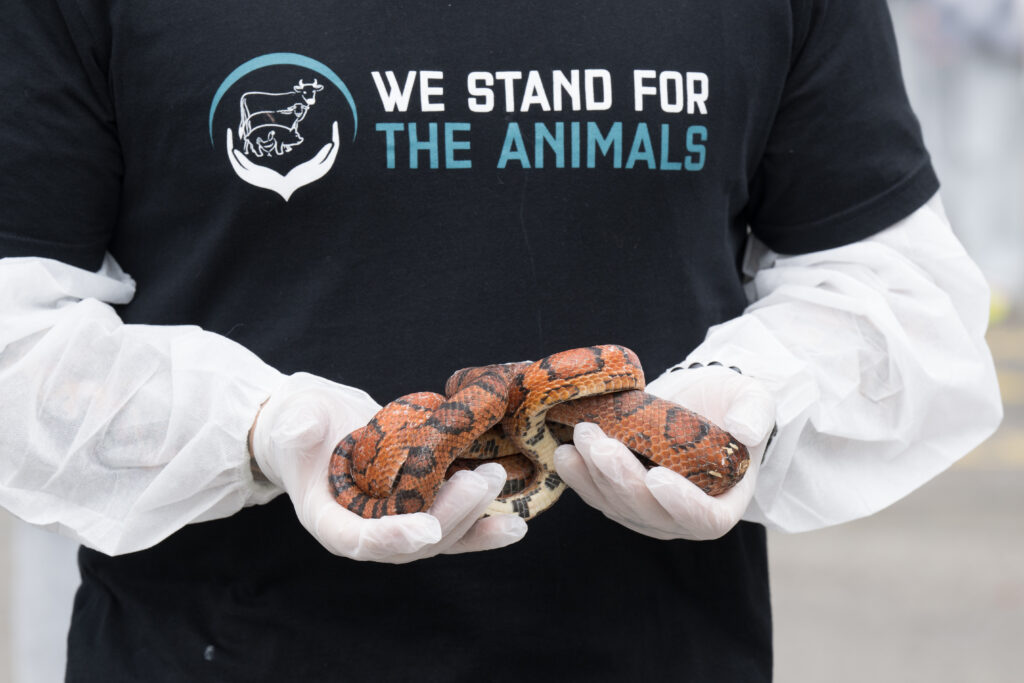
The ceremony also honored the 115 million animals tortured and killed worldwide in the name of experimentation. Species include sheep, horses, dogs, cats, fishes, and monkeys – but the vast majority of those killed are mice and rats. In the UK, all new drugs must be tested on a “rodent” species, as well as another mammal. This is despite the fact that 90 percent of medicines that show promising results in animals go on to fail at human trials.
Animal testing is a hugely hidden industry, and investigations have found that beings are regularly subjected to torturous conditions. An investigation at Imperial College, London, found that mice had tubes inserted into their brains, before being subjected to major organ damage and surgical mutilation. They were starved and deprived of water for days, while also forced to run on treadmills to avoid electric shocks.
Wildlife harmed by humans
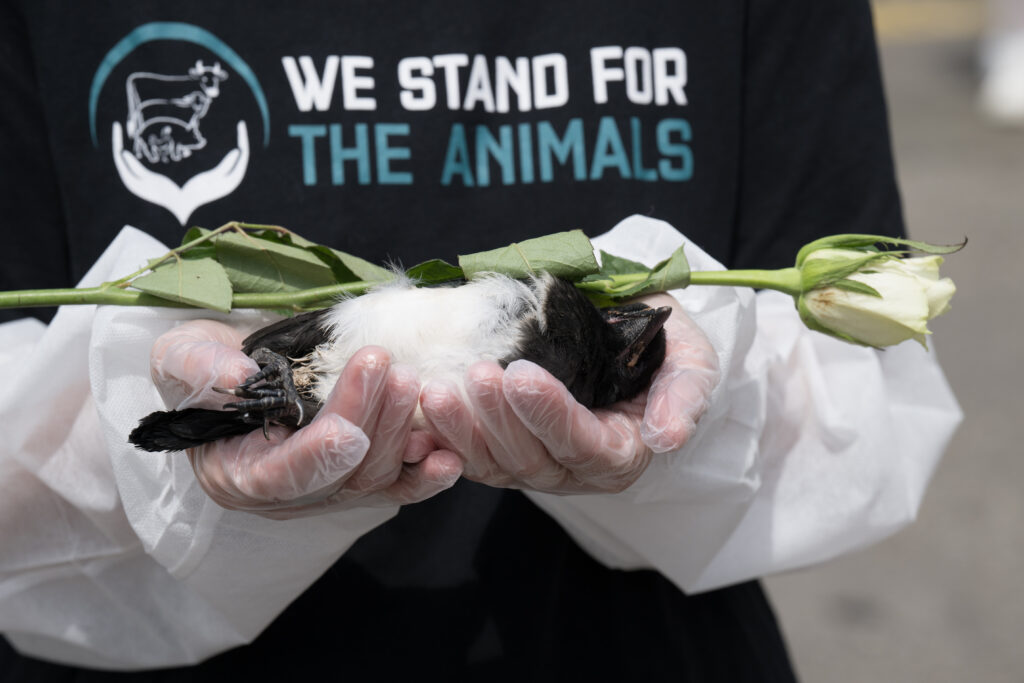
As well as those who are bred for human use, the memorial also shone a light on the many ways humans cause suffering to wild animals. A key example being foxes.
Fox hunting was theoretically outlawed in Britain in 2004, but this “sport” still continues all over the country. Fox hunting generally refers to an activity that sees (often extremely wealthy) people hunt foxes with dogs while riding on horseback. When they are caught, the foxes will often be ripped apart and suffer agonizing deaths. Hunters often use a legal loophole to carry out their hunts, claiming that they are “trail hunting.” Trail hunting was introduced by hunters after the ban. They argue that it’s non-lethal, and that dogs simply follow a pre-laid false scent trail. In practice, however, foxes are often killed in trail hunts.
Fox hunting is regularly exposed by hunt saboteurs and the UK media. In February of this year, ITV News published a video showing an apparently illegal fox hunt taking place in Wiltshire. Members of the Avon Vale hunt, which has since been disbanded, were seen digging foxes out of dens before allowing their hounds to chase them.
The importance of the memorial
Animals are not ours to use in any way, and there is no ethical way to breed, exploit, and kill animals for profit or enjoyment. By communicating this message in such a public setting, it’s hoped that the participants will plant seeds in the minds of the public, most of whom would never have given a second thought to the cruelty of human treatment of animals.
“I founded We Stand For The Animals just over three years ago to help bring the focus in the movement back to the animals,” says Blake. “The Memorial is an opportunity to pay our respects to non-humans worldwide and to give some of these individuals a ceremony that celebrates their lives. We are an abolitionist organisation and the event brings activists together in the fight against speciesism.”
A We Stand For The Animals memorial also took place in Liverpool on the same day. If you are interested in organizing a memorial in your area, or just want to learn more about We Stand For The Animals, you can visit its Facebook page.
